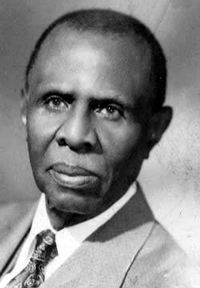 Jean Price-Mars was born Oct. 15, 1876 in La Grande Rivière du Nord, Haiti. With the passing of his mother, he was raised by his grandmother and father in an atmosphere of religious tolerance. In his early life, his father instilled in him an appreciation and respect for the local culture by introducing him to Haitian folklore notions. After his high school studies at Lycée Grégoire in Cap-Haïtien and Lycée Pétion in Port-au-Prince, he received a scholarship to study medicine in France. In addition to medicine, he also pursued other disciplines such as Humanities and Social Sciences at the Sorbonne University in France, as well as the College de France and the Trocadero Museum.
Jean Price-Mars was born Oct. 15, 1876 in La Grande Rivière du Nord, Haiti. With the passing of his mother, he was raised by his grandmother and father in an atmosphere of religious tolerance. In his early life, his father instilled in him an appreciation and respect for the local culture by introducing him to Haitian folklore notions. After his high school studies at Lycée Grégoire in Cap-Haïtien and Lycée Pétion in Port-au-Prince, he received a scholarship to study medicine in France. In addition to medicine, he also pursued other disciplines such as Humanities and Social Sciences at the Sorbonne University in France, as well as the College de France and the Trocadero Museum.
His middle name, Price, was given to him in tribute to the writer Hannibal Price, a mulatto author known for his famous book “On the Rehabilitation of the Black Race by the Republic of Haiti.” He combined the names Price, the name of the renowned mulatto author, and Mars, the name of his black father, to express “his desire to see his brothers live in solidarity and peace.”
Price-Mars is recognized as one of the most prominent Haitian ethno-anthropologists for playing a leading role in the development of human and social sciences. The creation of the Institute of Ethnology in 1941 is noted as one of his major accomplishments, for the research center has trained many Haitian anthropologists and exemplified the “decolonization of anthropological knowledge.” Price-Mars also represented a source of inspiration for the African elite and Diaspora in their quest for identity and liberalization.
As a fervent defender of “Vodou,” he strongly advocated for its recognition as a religion in its own right and as the bedrock of Haitian culture. He also fought vehemently for universal education, as he believed education to be the only path toward civilization.
While in France, whether as a student or as a diplomat, Price-Mars had the opportunity to engage with black intellectuals such as Aimé Césaire and Léopold Sédar Senghor. He played a primary role in the Negritude movement, which prompted the revival of African cultural nationalism.
In recognition of his work and influence, in 1956 he was unanimously elected President of the First Congress of Black writers and artists. Price-Mars is known as a prolific writer, as he has authored more than one hundred books, articles, and speeches in the fields of anthropology, history, pedagogy, politics and literature. His seminal work, “So spoke the Uncle,” has been published and translated into several languages. In this book, he explored “the foundations of both the history and folklore of Haitian culture”. This book was written during the American occupation (1915-1934) in the hope of supporting “Haitian cultural nationalism “against the occupier.
He was Dean of the State University of Haiti when he retired in 1960. He died on March 1, 1969 in Pétion-Ville.

